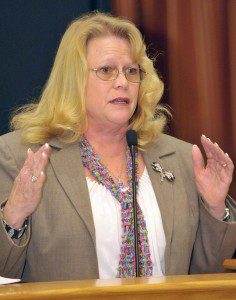WESTFIELD – The City Council’s Finance Committee reviewed the budgets of several departments last night seeking options to increase revenue collected by those departments.
City Collector Michael McMahon was asked a number of questions about the “efficiency” of tax collection within his department and if that department, critical to revenue collection, is properly staffed.
McMahon said that the department is currently at a full staffing level. Ward 5 Councilor Robert Paul Sr., a member of the Finance Committee, noted that several of the departments have staff with the same job classification and asked if it would be more efficient, and cost effective, to establish a clerical pool to serve all City Hall departments.
”We tried that a while ago,” McMahon said. “It didn’t work out too well because of the different skills needed in different departments.”
Finance Chairman Christopher Keefe, the Ward 1 Councilor, asked about percentages of various tax categories collected by McMahon’s department, such as property and excise taxes.
McMahon said that 99 percent of property tax is collected annually and that the department has a process for collection of delinquent taxes.
Keefe estimated that the one percent of taxes which are delinquent represent about $639,000 and asked about the process of collecting those delinquent funds.
“After two or three years we put that property into tax title which is the first step to foreclosing on the property,” McMahon said, adding that usually property owners make arrangements to pay the owed taxes, and 14 percent interest, before the city takes the property.
McMahon said that he anticipated that excise tax for the current fiscal year, which ends June 30, will be just over $3.9 million. Delinquent vehicle owners are charged 12 percent on their outstanding excise tax bills.
McMahon said his department notifies the Registry of Motor Vehicles about delinquent excise payments and that vehicles owners usually pay when they attempt to renew their driver’s license or vehicle registration and find they are blocked by the Registry of Motor Vehicles because of the excise tax owed.
“Excise tax revenue took a major dip when the recession hit,” McMahon said because people held onto their older vehicles longer than before the recession. “Now it’s almost back to what it was before the recession.”
City Assessor Robin Whitney was asked by At-large Councilor David A. Flaherty about that department’s role in administrating tax incentive financing (TIF) agreements between the city and businesses. The City Council votes to approve a package of property and personal tax breaks for companies building new facilities or expanding existing buildings in the city, a process that increases the overall property tax value after the TIF expires.
The TIFs, which also have to be approved by state agencies, are directly linked to commitments by the business, including adding new jobs to the local workforce. Flaherty has been uncomfortable with the scrutiny of compliance with those committments by businesses awarded TIFs.
Whitney said companies awarded TIFs have to make regular reports to the state and that her department has links to those websites.
“We can get in and check,” Whitney said, adding that in the past City Advancement Officer Jeff Daley, who brokered many of the TIF agreements, also did his own compliance check. At least one company was found in default of staffing levels and hired new people to bring itself into compliance.
Whitney said that she will discuss the TIF compliance process with Joseph Mitchell, the newly hired City Advancement Officer. “I’ll ask him if he plans to follow up with that practice,” Whitney said.
Health Director Joseph Rouse was also questioned about increasing revenue at the city’s Twiss Street Transfer Station. The city is seeking to increase the tip limit from the current 50 tons a day, which is just sufficient for curbside collection of solid waste, to as high as 150 tons a day, which would allow the city to collect commercial solid waste and perhaps construction debris and which would generate a much greater revenue stream.
Rouse said that when he was appointed the tip lift process, which requires licensing by the state Department of Environmental Protection (DEP), was two years behind the timeline established.
“We’re making progress, have regular meetings with our consultants, Tighe & Bond, and have gotten the permitting process back on track,” Rouse said. “We have a design for the new facility which will include a 21,000-square-foot enclosed tipping building.”





